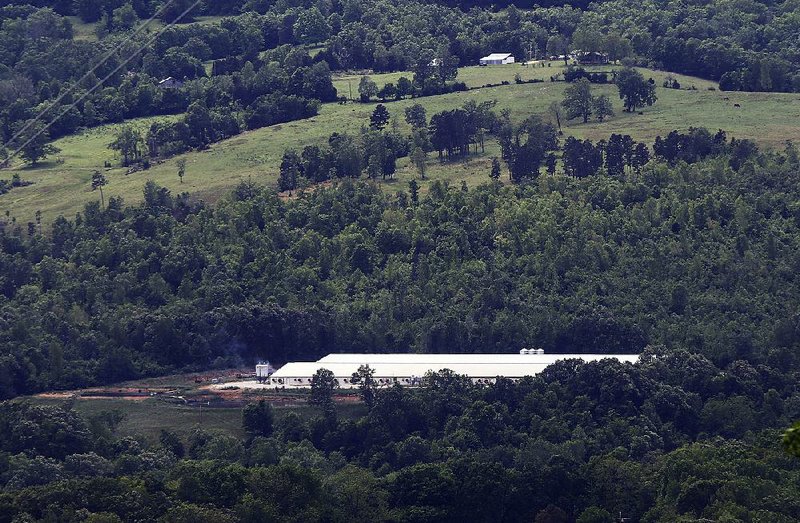A Newton County hog farm is continuing its fight to keep operating near the Buffalo River.
C&H Hog Farms has submitted application documents for a different type of operating permit, three months after another application was turned down.
If all of the documents are submitted and the application is approved by the Arkansas Department of Environmental Quality, C&H Hog Farms would be able to continue operating under a five-year permit. The farm that houses 6,503 hogs is still operating under its expired permit while the owners appeal the department's denial of their application.
It was unclear Tuesday whether the hog farm had submitted its entire application. Messages left at the Department of Environmental Quality were not returned, and Jason Henson, a farm co-owner, and the other owners did not respond to messages seeking comment.
C&H Hog Farms has become a concern for environmental groups that fear manure could leak into and pollute the Buffalo National River.
The farm is on Big Creek, about 6 miles from where it flows into the Buffalo River, which had about 1.5 million visitors last year. C&H was the first and remains the only federally classified medium or large hog farm in the area.
Unlike the application denied earlier this year, the farmers' nutrient-management plan notes that it will maintain the number of hogs at 6,503 -- 2,503 hogs of 55 pounds or more and 4,000 pigs of less than 55 pounds. Their denied application proposed six boars of about 450 pounds apiece, 2,672 sows of at least 400 pounds each and 750 piglets of about 14 pounds each.
C&H is applying for a Regulation 6 individual permit, which is a wastewater discharge permit under federal regulations implemented by the Environmental Quality Department.
It's a different permit from the one the farm was originally permitted under, which was a Regulation 6 general permit, because conditions for individual permits are tailored to the facility and conditions for general ones assume what is appropriate based on similar facilities.
It's also different from the permit C&H applied for in 2016, which was a Regulation 5 individual permit under state water regulations.
State water regulations are supposed to be at least as strict as federal regulations.
All other hog farms in Arkansas are permitted under Regulation 5. C&H cannot apply to renew its Regulation 6 general permit because the state chose to discontinue the permitting program.
The farmers prefer a Regulation 5 permit and would close their application if they could get one, Henson wrote in an email that included the initial application packet Thursday night.
The farmers are awaiting an August trial before the Arkansas Pollution Control and Ecology Commission to see if they can obtain or begin the process to obtain a Regulation 5 permit.
Richard Mays, an attorney for intervenors who oppose C&H in the case, said Tuesday that he and his clients were unaware C&H had applied for a Regulation 6 permit.
"They're trying to cover all their bases," he said.
Mays said he thinks the department can require whatever it wants of C&H and that the facility would likely face the same obstacles.
The Environmental Quality Department denied C&H Hog Farms an operating permit in part because the operation did not conduct a study on the flow direction of groundwater or develop an emergency action plan, according to the department's responses to public comments on the permit application.
The study and the plan were recommended by the Agricultural Waste Management Field Handbook, and the department determined they were necessary because of the rocky karst terrain upon which the farm sits.
The permit application documents submitted Thursday do not appear to include an emergency action plan or a study on the groundwater, but it was unclear whether the documents filed at the department were the entirety of the application.
Henson wrote in his email Thursday that he would send more documents but was unable to send them all at once because of the size of the files.
C&H has asked the Pollution Control and Ecology Commission to allow it to argue that the department improperly denied the Regulation 5 permit.
The department has filed a motion to dismiss, and the Buffalo River Watershed Alliance and the Ozark Society have intervened.
In the application, the farmers said the operation generates about 2 million gallons of wastewater annually.
C&H has 630.7 acres to which it can apply the manure as fertilizer, they wrote.
The facility would have a holding pond that could contain nearly 2.4 million gallons of manure and a shallow pit that could contain nearly 800,000 gallons.
The application also includes numerous land-use contracts for potential application of manure and setback requirement waivers to apply manure up to neighbors' property lines.
C&H's operators also have explored expanding their hog production in Johnson County.
Metro on 04/18/2018

